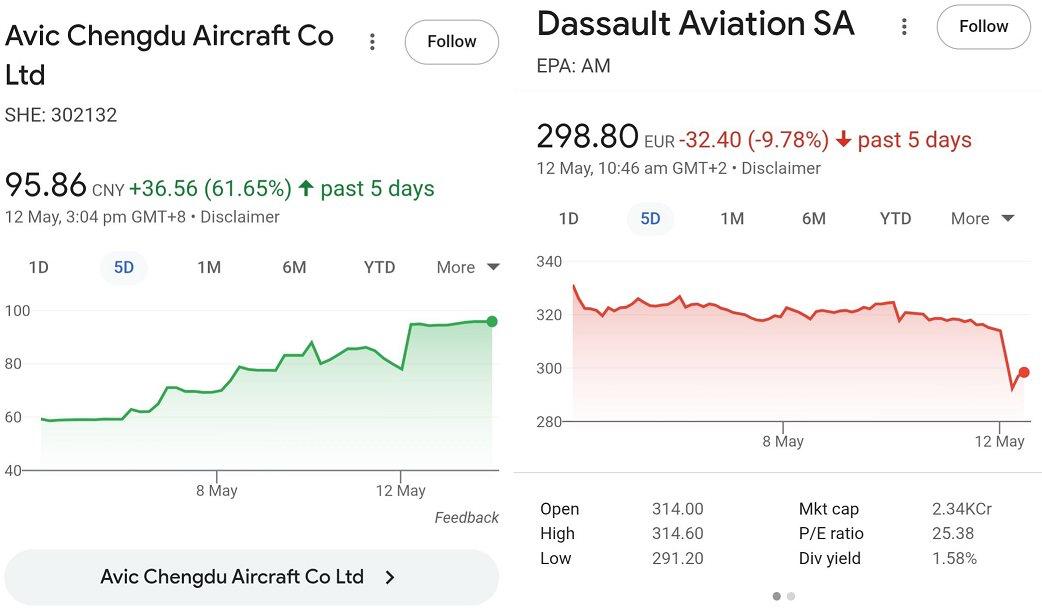Islamabad: After the Pakistan-India clash, shares of the Chinese company (AVIC Chengdu), which manufactures the JF-17 and J-10C, rose by 62%, while shares of the French company (Dassault Aviation), which produces the Rafale, dropped by 10%.
Following the recent military clash between Pakistan and India, the global defense markets responded sharply, reflecting investor sentiment toward the involved countries’ military hardware suppliers.
Notably, shares of China’s AVIC Chengdu Aircraft Industry Group, which manufactures the JF-17 Thunder and J-10C fighter jets used by Pakistan, surged by 62%, signaling a boost in confidence in Chinese defense technology and potential future demand from allies or buyers impressed by the performance of these aircraft during the confrontation.
In contrast, shares of France’s Dassault Aviation, the maker of the Rafale jets employed by the Indian Air Force, fell by 10%.
This decline likely reflects investor concerns about the perceived performance or strategic implications tied to India’s Rafale fleet during the conflict, as well as potential geopolitical shifts in regional air power dynamics.
The divergent stock movements underline how real-world conflict scenarios can have a profound impact on defense contractors’ market valuations, especially when their products are directly involved in high-stakes engagements.
It also suggests shifting investor sentiment toward Chinese defense technology as a rising global competitor.
During the recent military escalation between Pakistan and India, reports emerged claiming that Pakistan had successfully shot down an Indian Air Force (IAF) Rafale fighter jet, a development that, if verified, would mark a significant moment in South Asian air power dynamics.
The Rafale, a 4.5-generation multirole combat aircraft developed by France’s Dassault Aviation, is considered one of the IAF’s most advanced and expensive assets, equipped with cutting-edge avionics, radar, and weaponry.
According to Pakistani sources, the Rafale was engaged and neutralized using either the JF-17 Thunder or J-10C, both Chinese-origin fighter jets in service with the Pakistan Air Force (PAF).
Read More: BBC Confirms Footage of Crashed Indian Rafale Jets
While India has not officially acknowledged the loss, the claim has already had geopolitical and economic ramifications. Shares of Dassault Aviation dropped by 10%, reflecting investor concern and questioning the Rafale’s performance under real combat conditions.
In contrast, Chinese defense stocks surged, particularly those of AVIC Chengdu, which manufactures the aircraft credited with the engagement.
Also Read: French Intelligence Confirms Rafale Jet Downed by Pakistan; CNN
If confirmed, the downing of a Rafale by a comparatively lower-cost aircraft would raise critical questions about cost-effectiveness, air superiority, and defense procurement strategies in the region, potentially influencing future arms deals and alliances across Asia and beyond.









